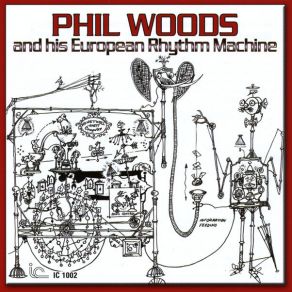Phil Woods and His European Rhythm Machine
Download links and information about Phil Woods and His European Rhythm Machine by Phil Woods. This album was released in 1976 and it belongs to Jazz, Bop genres. It contains 5 tracks with total duration of 40:30 minutes.

|
|
|---|---|
| Artist: | Phil Woods |
| Release date: | 1976 |
| Genre: | Jazz, Bop |
| Tracks: | 5 |
| Duration: | 40:30 |
| Buy it NOW at: | |
| Buy on iTunes $9.99 | |
| Buy on iTunes $9.99 | |
| Buy on Amazon $4.95 | |
Tracks
[Edit]| No. | Title | Length |
|---|---|---|
| 1. | Chromatic Banana | 12:13 |
| 2. | Ultimate Choice | 9:48 |
| 3. | The Last Page Sans Melodie | 6:45 |
| 4. | A Look Back | 2:54 |
| 5. | The Day When the World | 8:50 |
Details
[Edit]In 1970, when Inner City Records was just getting off the ground, Phil Woods was in Europe enjoying himself, and collaborating with musicians who were definitely feeling the spell of the Miles Davis groundbreaking jazz fusion epic Bitches Brew. While always a staunch straight-ahead bebop player, Woods decided to mix it up a bit and incorporate elements of funk, rock, and free improvisation, much to the likely chagrin of his listeners. In fact, a vitriolic letter printed on the back cover from an unidentified fan residing in Chicopee Falls, MA, rips Woods for abandoning melody, criticizes his titles, and actually threatens him with physical violence should he ever show up in his town. Woods gives his terse reply, but as cynical as this discourse is, it could all have been whipped up by Woods to deflect any detractors to his "new thing." Truth be told, the music here is inspired and focused, even if it is not what devotees might expect. British electric pianist Gordon Beck (who took over for original keyboardist George Gruntz), French acoustic bassist Henri Texier, and Swiss drummer Daniel Humair are all extremely talented musicians, who alongside the excitable Woods forge strong bonds in amalgamating this modern jazz into a personalized sound. Bookended by really long jam-type pieces, the album also retains a certain amount of arranged and complex melody lines. The opener, "Chromatic Banana," is the piece that caused the letter-writing fan's consternation, and in the hilarious liner notes, Woods offers listeners a chance to win one in simulated plastic. Musically, it moves fast from 6/8 to free to 5/4, 4/4, and 7/8 meters in pre-fusion rock-funk modes, with the alto and Varitone-modified sax of Woods wheezing, wailing, improvising, and eventually vocally scatting. Beck's "The Day When the World..." has a folkish intro on the Hohner electric piano, moves from a steady rock beat to a poppish tune, and concludes with introductions of the bandmembers by one of the leader's children in English and French. A combo track of Beck and Woods, "The Last Page/Sans Melodie" starts as a pleasant ballad, then quickens to a bop and rock pace with Woods on a Varitone clarinet. The most straight jazz-oriented cut is also contributed by Beck: "Ultimate Choice" is a fleet bebop discourse between the pianist and alto saxophonist, with hard attacks and Woods digging in and establishing his territory. The short "A Look Back" is actually forward-thinking and progressive in a spontaneous manner via the spare recorder playing of Woods underpinning clacky percussion, rattles, and bowed bass. This recording, the second overall release in the Inner City catalog (with artwork containing a Rube Goldberg-type Honeywell computer schematic and the label's original skyscraper type logo), has been issued on CD, and it is a testament to the tenacity of Phil Woods to think outside the box occasionally, while losing none of his identity. The project deserves a revisit, despite some of the fans' misgivings. ~ Michael G. Nastos, Rovi